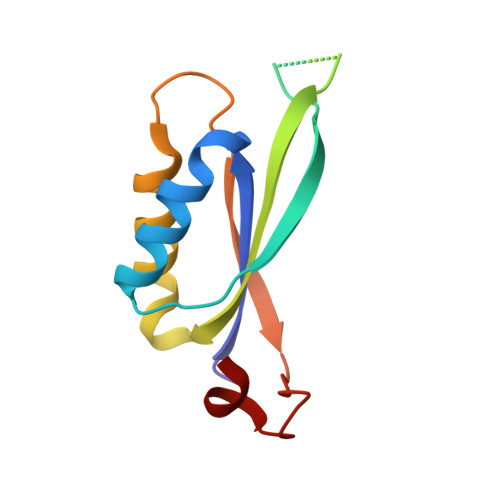Crystal structures of the apo and ATP bound Mycobacterium tuberculosis nitrogen regulatory PII protein.
Shetty, N.D., Reddy, M.C., Palaninathan, S.K., Owen, J.L., Sacchettini, J.C.(2010) Protein Sci 19: 1513-1524
- PubMed: 20521335
- DOI: https://doi.org/10.1002/pro.430
- Primary Citation of Related Structures:
3BZQ, 3LF0 - PubMed Abstract:
PII constitutes a family of signal transduction proteins that act as nitrogen sensors in microorganisms and plants. Mycobacterium tuberculosis (Mtb) has a single homologue of PII whose precise role has as yet not been explored. We have solved the crystal structures of the Mtb PII protein in its apo and ATP bound forms to 1.4 and 2.4 A resolutions, respectively. The protein forms a trimeric assembly in the crystal lattice and folds similarly to the other PII family proteins. The Mtb PII:ATP binary complex structure reveals three ATP molecules per trimer, each bound between the base of the T-loop of one subunit and the C-loop of the neighboring subunit. In contrast to the apo structure, at least one subunit of the binary complex structure contains a completely ordered T-loop indicating that ATP binding plays a role in orienting this loop region towards target proteins like the ammonium transporter, AmtB. Arg38 of the T-loop makes direct contact with the gamma-phosphate of the ATP molecule replacing the Mg(2+) position seen in the Methanococcus jannaschii GlnK1 structure. The C-loop of a neighboring subunit encloses the other side of the ATP molecule, placing the GlnK specific C-terminal 3(10) helix in the vicinity. Homology modeling studies with the E. coli GlnK:AmtB complex reveal that Mtb PII could form a complex similar to the complex in E. coli. The structural conservation and operon organization suggests that the Mtb PII gene encodes for a GlnK protein and might play a key role in the nitrogen regulatory pathway.
Organizational Affiliation:
Department of Chemistry, Texas A&M University, College Station, Texas 77843-2128, USA.















